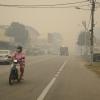News

06 March 2025
IIASA’s CAT Research Group joined the UN ECOSOC Partnership Forum 2025’s event: Global Challenges Action Innovation, Emerging Technologies & the Power of Partnerships
The ever-evolving global challenges have made the need for innovative solutions more evident. Due to their work and experience in developing AI-based tools for addressing global issues, IIASA's Cooperation and Transformative Governance Research Group has been invited to share their insights on developing AI-based solutions for sustainable policy crafting at the “Global Challenges Action Innovation, Emerging Technologies & the Power of Partnerships" event, a side event to the "UN ECOSOC Partnership Forum 2025.”

21 February 2025
Vietnamese Ambassador and IIASA discuss strengthening research collaboration
On 14 February 2025, IIASA welcomed H.E. Ambassador Vu Le Thai Hoang, Permanent Representative of the Socialist Republic of Vietnam to the International Organizations in Vienna, to explore advancing research cooperation between IIASA and Vietnam.

10 February 2025
ASA's ECOANTITRUST Project Awarded Research Grant to study Systems Approaches for Antitrust in the Digital Economy
ASA is excited to announce that the ECOANTITRUST initiative led by ASA Program Director, Elena Rovenskaya, has been awarded the innovative Competition Policy and Power Research (CPPR) Fund to continue its exploration of systems analysis approaches for competition regulation of the digital economy.
Focus
27 June 2024
Improving national SDG reporting through citizen science
Working with IIASA researchers, Ghana pioneered the adoption of a citizen science approach to address the problem of plastic pollution in marine environments. Further analysis highlighted how a similar citizen science data validation and reporting process can benefit reporting on the Sustainable Development Goals (SDGs) in other countries.

27 June 2024
IIASA analysis underpins the European Commission’s 2040 climate target recommendation
IIASA researchers played a central role in the European Commission’s recommendation for the 2040 climate target, from delivering the scientific foundation and establishing dialogue with the community, to being among the renowned scientists selected as members of the European Scientific Advisory Board on Climate Change.

Impacts
19 August 2021
Water for growth
Impact Sheet #20, August 2021. IIASA and partners in East Africa are studying how the region’s economic development could affect water resources.

18 January 2021
Assessing biofuels for transport
Impact Sheet #18, January 2021. IIASA models feed into the biofuel policies of international aviation and the EU road transportation sector, helping to steer them towards cleaner feedstocks.

11 January 2021
Limiting global temperature increase to 1.5°C above pre-industrial levels
Impact Sheet #19, January 2021. IIASA research has guided the global policymaking community in their efforts to limit global temperature increase to this ambitious goal. When the world’s attention was focussed toward the 2°C target, the institute’s sophisticated analysis mapped credible pathways towards the 1.5°C goal

Policy briefs
09 April 2024
Forest science and education in Ukraine: Priorities for action
Ukraine’s forest sector is suffering unprecedented challenges. War has impacted both forests and forestry – devastating forest areas, infrastructure and industry, as well as causing ‘brain drain’ and capacity loss due to the disruption of research institutions and the displacement of students and scientists. These impacts are compounded by factors including climate change, unstable forest health dynamics, landscape fires, and an overall decrease in forest productivity.

04 October 2023
ENGAGE Summary for Policymakers
As the world faces the risks of dangerous climate change, policymakers, industry and civil society leaders are counting on Integrated Assessment Models (IAMs) to inform and guide strategies to deliver on the objectives of the Paris Agreement (PA) and subsequent agreements.

03 October 2023
Stakeholder engagement in climate change solutions
Policy Brief #42, October 2023. Workshops bringing scientists together with stakeholders from various backgrounds have shown the importance of dialogue for co-designing climate pathways and highlighted the need for physical meetings and capacity building.

Policy applications
22 February 2023
Centre for Integrated Assessment Modelling (CIAM)
Since 1999 IIASA has been hosting the Centre for Integrated Assessment Modelling (CIAM), one of the four centres assigned for the European Monitoring and Evaluation Programme (EMEP) of the Convention on Long-range Transboundary Air Pollution.

22 February 2023
GAINS analyses for the 2009 United Nations Climate Change Conference - COP15 in Copenhagen
As input to the climate negotiations at COP15 in Copenhagen 2009, IIASA has developed a coherent international comparison of greenhouse gas mitigation efforts among Annex I Parties in 2020. This web site provides interactive access to an on-line calculator, underlying input data, and documentation of the methodology.

22 February 2023
Pollution Management in Developing Countries
There is an urgent need in the developing world for increased support on pollution management in order to respond to the magnitude of the threat to human health and economies. Responding to pollution is a challenge that is solvable in the near term to save lives and unlock economic opportunity through action at the local, national, regional and global levels.
The methods developed by the PM Group offer an integrated perspective on cost-effective policy interventions that improve air quality, reduce negative health impacts, and deliver benefits for a wide range of development goals.
